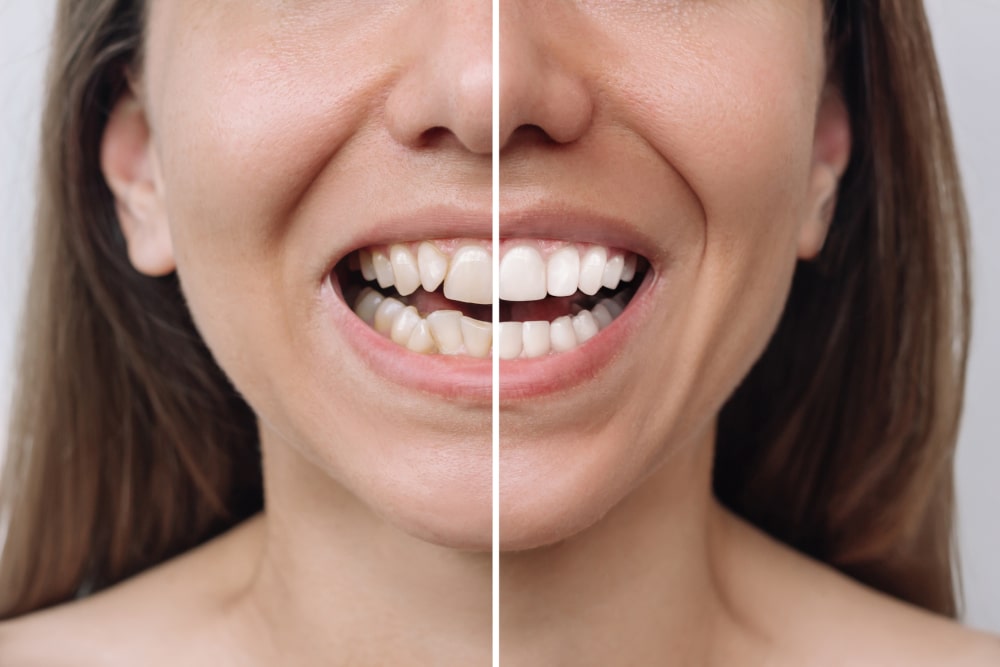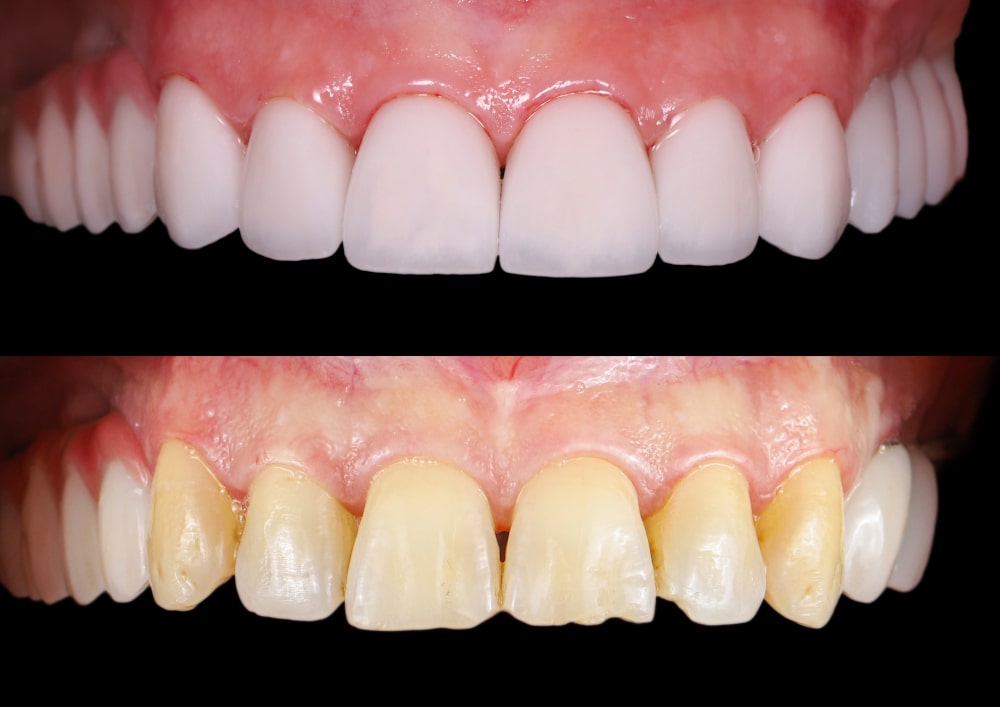
Key Takeaways
-
Veneers are a quick but lasting solution for chipped, stained, or crooked teeth.
-
Porcelain veneers are more durable and stain-resistant than composite ones.
-
Not everyone is a candidate for veneers. Consider your oral health and budget.
-
North York Smile Centre offers high-quality porcelain veneers customized to your needs.
Struggling with Chipped or Stained Teeth?
Do you stop yourself from smiling because you're embarrassed about your teeth?
Chipped, stained and crooked teeth aren't just cosmetic issues. They can slowly chip away at your confidence—making social situations uncomfortable and photo opportunities something to avoid. Whether it's a coffee habit or a minor accident that left a tooth chipped, the results can feel permanent.
But they don’t have to be.
Veneers might be the solution you've been searching for. In fact, they’re one of the most requested procedures for people dealing with cosmetic imperfections in their teeth.
What Exactly Are Veneers (And How Do They Work)?
Veneers are thin, custom-made shells bonded to the front surface of your teeth. They're designed to mimic the look and feel of natural enamel, while correcting shape, colour, or alignment issues.
Types of Veneers
-
Porcelain Veneers: Highly durable, stain-resistant, and natural-looking. Ideal for long-term results.
-
Composite Veneers: Less expensive, made in-office, but not as long-lasting.
So, what’s better? If you’re looking for longevity and aesthetics, porcelain wins. Composite is a more budget-friendly option, butit may need replacing sooner.
Compared to other treatments:
-
Whitening can only address stains, not chips or gaps.
-
Bonding can fix small chips but lacks the durability and polish of veneers.
-
Crowns cover the whole tooth and are more invasive, often used when there’s significant damage.
Can Veneers Fix Your Specific Problem?
If you’re wondering whether veneers can help with your unique situation, here’s a breakdown:
-
Chipped Teeth: Yes! Veneers are excellent at covering and strengthening chipped teeth, making them look whole again.
-
Deep Stains: If professional whitening hasn’t worked, veneers provide a consistent, white smile.
-
Crooked or Gapped Teeth: Veneers for crooked teeth work well for mild misalignments. In fact, crooked teeth veneers have become a go-to alternative for people who want faster results than braces or Invisalign.
Bonus? Veneers can also subtly enhance the shape and length of your teeth, helping create a more symmetrical smile.

Are Veneers the Best Choice for You? Let’s Find Out
Veneers can be a great fit if:
-
You have healthy gums and teeth
-
You want to correct chips, stains, or slight misalignments
-
You’re committed to long-term oral care
But they might not be for you if:
-
You have untreated gum disease or decay
-
You grind your teeth excessively (though a nightguard can help)
-
You’re looking for a reversible treatment
Still wondering, “Can you get veneers with bad teeth?”
The answer depends on how “bad” is defined. If your teeth are structurally compromised, a crown may be a better choice. A thorough exam will help your dentist decide.
Other options to explore: bonding, orthodontics, or whitening—depending on your needs.
The Process: What to Expect When Getting Veneers
Here’s a step-by-step walkthrough:
-
Consultation
Your dentist will examine your teeth, take X-rays if needed, and discuss your goals. -
Tooth Prep
A small layer of enamel is shaved off—usually painlessly with a local anesthetic. -
Getting the Veneers
Impressions are taken, and custom veneers are created. After 1–2 weeks, they’re bonded to your teeth.
What surprises most people? How fast does the transformation happen? One moment you’re hesitant to smile, the next you’re loving your reflection.

The Good and the Bad: Pros & Cons of Veneers
Why People Love Veneers
-
Instant smile transformation
-
Stain-resistant and durable
-
Look and feel natural
What You Should Consider First
-
It’s permanent – once your enamel is filed down, there’s no going back.
-
Cost – porcelain veneers can range from $1,000 to $2,500 per tooth.
-
Can veneers break? Yes, but it’s rare. If they do, they’ll need to be replaced—not repaired.
How to Make Your Veneers Last for Years
With the right care, veneers can last 10–15 years.
Here’s how to keep them looking great:
-
Brush and floss like you would with natural teeth.
-
Avoid biting on hard things like pens or ice.
-
Minimize stain-causing foods and drinks (coffee, red wine).
-
See your dentist every 6 months for checkups and cleanings.
Porcelain Veneers at the Smile Centre
At Smile Centre, we specialize in custom porcelain veneers designed to complement your unique facial structure and smile goals. Our experienced cosmetic dentists use high-grade materials and advanced imaging to ensure a perfect fit and natural finish.
“We don’t just enhance your smile—we design it to harmonize with your personality and lifestyle,” says Dr. Jerry Jesin, DDS. “The right veneers should feel like your own teeth—only better.”
Ready to transform your smile? Book a free consultation today!
FAQs: Common Questions About Veneers
Q: Can you get veneers with bad teeth?
A: If your teeth are decayed or damaged, they may need treatment first. In some cases, crowns may be better.
Q: Are veneers only for front teeth?
A: Typically, yes. They’re most effective on the teeth visible when you smile.
Q: Do veneers feel different?
A: After a brief adjustment period, most people say they feel just like natural teeth.
Q: Are veneers for crooked teeth better than braces?
A: For minor cases, veneers for crooked teeth offer faster results. Severe misalignment still requires orthodontics.
Sources & Further Reading
Canadian Dental Association – Bonding and Veneers

